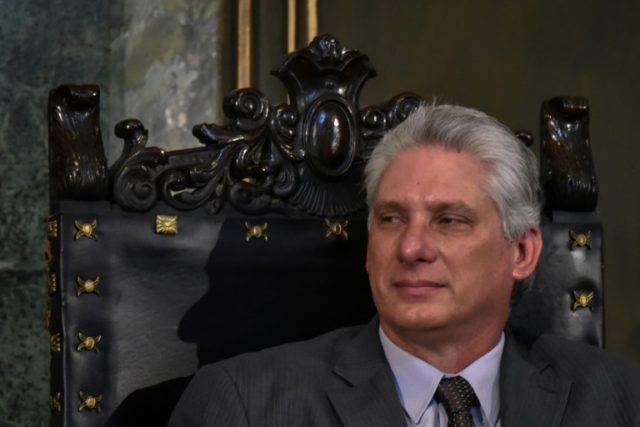Cuban “President” Miguel Díaz-Canel, who is subordinate to dictator Raúl Castro, appeared on video salsa dancing and playing drums at an event to cap off his visit to the United Nations in New York last week.
The visit – nominally to speak at the U.N. General Assembly, though his subsequent outings appear to make it seem like more of a vacation – concluded with his return to Havana Sunday evening. The Castro regime typically bans Cubans from making such trips to the United States, particularly if they are known to support democracy and human rights.
On Monday, the Spain-based Diario de Cuba published a video reportedly showing Díaz-Canel enjoying his last moments in the United States at a concert by a band featuring the son of Cuban Revolution figure Juan Almeida Bosque.
The outlet CiberCuba reports that the clip of Díaz-Canel dancing salsa appears to have been uploaded online by the Cuban ambassador to Belgium Norma Goicochea Estenoz, who celebrated the figureheads moves. “My president dancing at an event concluding his excellent first visit to the United Nations in New York,” she reportedly wrote on Sunday.
The videos appear to be of the same event given the appearance of the location and Díaz-Canel wearing the same clothes in both. It was not, reportedly, the only time that Díaz-Canel played drums during his stay in New York, however.
During another event, Díaz-Canel – who, like most of the Castro regime’s leaders, is white – was photographed playing bongos at an event at Riverside Church in Harlem with attendees dressed in white, a color with deep significance in the Cuban Yoruba/Lukumí pagan community, which is largely Afro-Cuban.
Maduro y Díaz Canel sostienen encuentro con movimientos sociales en Nueva York pic.twitter.com/DGfhUU6CMB
— La Radio del Sur (@laradiodelsur) September 27, 2018
Díaz-Canel became president of Cuba in April, a title that the Cuban constitution places below the ranking of head of the Communist Party and commander-in-chief, which both remain in the hands of Raúl Castro. Since his assumption of the presidency, the Cuban regime has begun an unprecedented crackdown on musicians who do not use their craft to praise Fidel Castro or his revolution. Cuba’s Ministry of Culture has warned against the production and consumption of reggaetón, a widely popular genre of music in much of Latin America increasingly gaining interest in Cuba, for years, calling it “not in accordance with legitimate Cuban popular culture.” Reggaetón artists have been censored on radio and television for lyrics centered around romance and sex, and those who dare use the genre to criticize the government have found themselves behind bars.
Most alarming for Cuban musicians and artists recently has been the proposal of “Decree 349,” which would ban artists who are not registered and approved by the Communist Party from appearing in either public or private locations. The decree would also punish individuals for sharing, selling, or in any way making available music production equipment to unapproved artists.
While most Cuban artists face increasing censorship, the Castro regime has spent resources promoting the musical careers of Jenny and Miguel Díaz-Canel, Jr., the president’s children.
Díaz-Canel, Sr., used his time in New York to condemn capitalism and President Donald Trump specifically at the U.N. General Assembly before meeting with dozens of celebrity fans including Robert De Niro, Coldplay’s Chris Martin, and director Darren Aronofsky.
Díaz-Canel concluded his time in New York with a visit to the site of the September 11, 2001, terrorist attacks, where he blamed global terrorism on “capitalism” without elaborating.

COMMENTS
Please let us know if you're having issues with commenting.